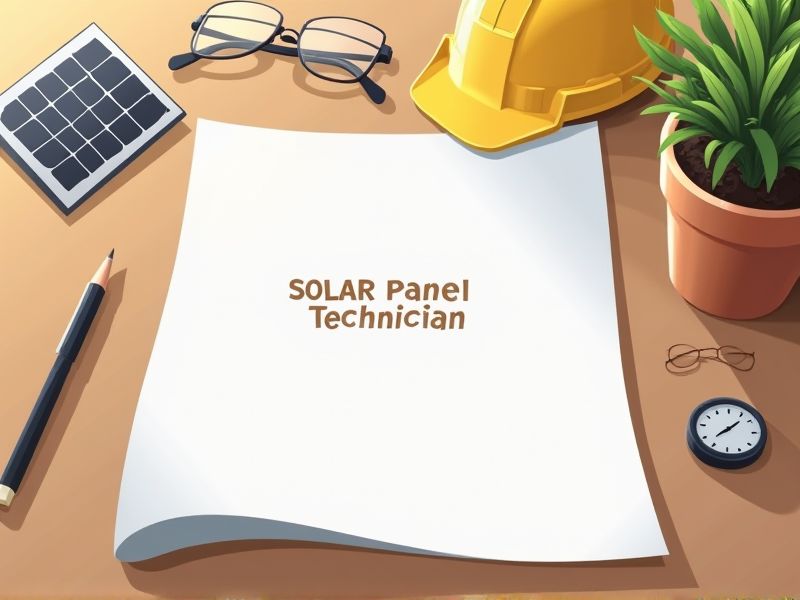
Solar panel technicians play a crucial role in the installation, maintenance, and repair of solar energy systems, directly impacting their efficiency and safety. Certifications ensure that these professionals possess the necessary knowledge and skills to handle complex electrical components and adhere to industry standards. Certified technicians also build trust with clients and employers, reducing liability and ensuring compliance with local regulations. Below are some essential certifications you may need as a solar panel technician.
NABCEP PV Installation Professional Certification
NABCEP PV Installation Professional Certification elevates a solar panel technician's credibility, often resulting in a higher trust level from clients. Earning this certification can lead to increased job opportunities, as many employers favor certified professionals. The certification ensures that technicians adhere to industry standards, reducing the risk of installation errors. Holding this credential often equates to staying updated with the latest solar technologies and safety protocols.
NABCEP PV Design Certification
NABCEP PV Design Certification enhances a solar panel technician's credibility, leading to greater trust from clients and employers. The certification validates a technician's competence in designing safe and efficient solar energy systems, ensuring compliance with industry standards. Technicians with this certification are likely to have increased job opportunities and can command higher wages due to their verified skill set. The certification encourages continuing education, keeping technicians informed about the latest industry developments and technologies.
NABCEP PV Technical Sales Certification
NABCEP PV Technical Sales Certification enhances credibility and trust with customers, increasing the likelihood of sales. Certification provides comprehensive knowledge in system design, which directly leads to more efficient and tailored solar solutions. Being certified often allows technicians to command higher wages due to their proven expertise and skills. The certification ensures compliance with current industry standards, which can help in avoiding potential legal and financial repercussions.
OSHA 10-Hour Construction Safety Certification
The OSHA 10-Hour Construction Safety Certification equips solar panel technicians with essential safety knowledge, reducing workplace accidents and injuries. Understanding safety protocols decreases the likelihood of costly downtime due to incidents. The certification assures employers and clients that technicians are trained to uphold industry safety standards. Improved safety awareness can lead to increased job efficiency and success rates in solar panel installations.
OSHA 30-Hour Construction Safety Certification
Increased regulatory requirements for solar installations mean OSHA 30-Hour Construction Safety Certification ensures technicians understand workplace safety standards. Compliance with OSHA standards reduces accident rates, leading to fewer worker injuries in solar panel projects. Training on hazard recognition equips technicians to handle risks associated with electrical and high-elevation work typical in solar panel installations. Certifications can also enhance employability, as companies prefer candidates with formal safety training to meet industry safety benchmarks.
Certified Electrician License
A Certified Electrician License ensures a solar panel technician understands electrical codes and safety standards, crucial for installing systems safely and effectively. Without proper certification, technicians may increase the risk of improper installations, leading to potential electrical hazards. Licensed electricians possess the necessary skills to integrate solar systems with the existing electrical grid, ensuring efficiency and reliability. Regulatory bodies mandate certification to maintain industry standards and protect consumer interests.
Electrical Safety Foundation International (ESFI) Certification
The ESFI Certification ensures that solar panel technicians possess a thorough understanding of electrical safety standards, reducing the risk of electrical hazards. With this certification, technicians demonstrate competency in managing complex electrical systems, which enhances reliability and trust among clients. A certified technician is more likely to adhere to industry best practices, minimizing potential installation errors. Certification can lead to increased job opportunities, as employers and clients prefer professionals who meet recognized safety and competency standards.
LEED Green Associate Certification
Achieving the LEED Green Associate Certification equips solar panel technicians with knowledge of green building practices, enabling them to better integrate solar solutions into sustainable structures. This accreditation enhances a technician's credibility and improves employability as it signifies a commitment to environmentally responsible construction standards. Knowledge of LEED principles allows technicians to align their installations with broader sustainability goals, potentially leading to more comprehensive energy solutions. Familiarity with LEED guidelines can also facilitate collaboration with architects and builders on projects aiming for certification.
Renewable Energy Professional (REP) Certification
The REP Certification ensures solar panel technicians have the necessary knowledge and skills to comply with modern industry standards for safety and efficiency. Certification often leads to higher employability, as employers prefer professionals who demonstrate verified expertise in renewable energy systems. As solar technology advances, the certification provides a framework for continuous learning, ensuring technicians stay updated with the latest advancements. Businesses benefit from hiring certified technicians as it reduces installation errors and maintenance costs, fostering customer trust and satisfaction.
Building Performance Institute (BPI) Building Analyst Certification
The BPI Building Analyst Certification equips solar panel technicians with fundamental knowledge of building science, ensuring installations maximize energy efficiency. By understanding whole-house energy dynamics, technicians can better recommend solar solutions that integrate seamlessly with existing systems. Certification provides credibility, increasing customer trust and potentially leading to more project opportunities. This qualification meets industry standards, aligning with regulations focused on sustainable and efficient energy practices.
Summary
When you obtain certifications as a Solar Panel Technician, expect increased credibility and trust from potential employers. Certifications often lead to enhanced job opportunities and potentially higher pay due to recognized expertise. Employers frequently prefer certified technicians due to reduced training costs and fewer risks. Certified technicians generally report greater job satisfaction and career advancement compared to non-certified peers.
